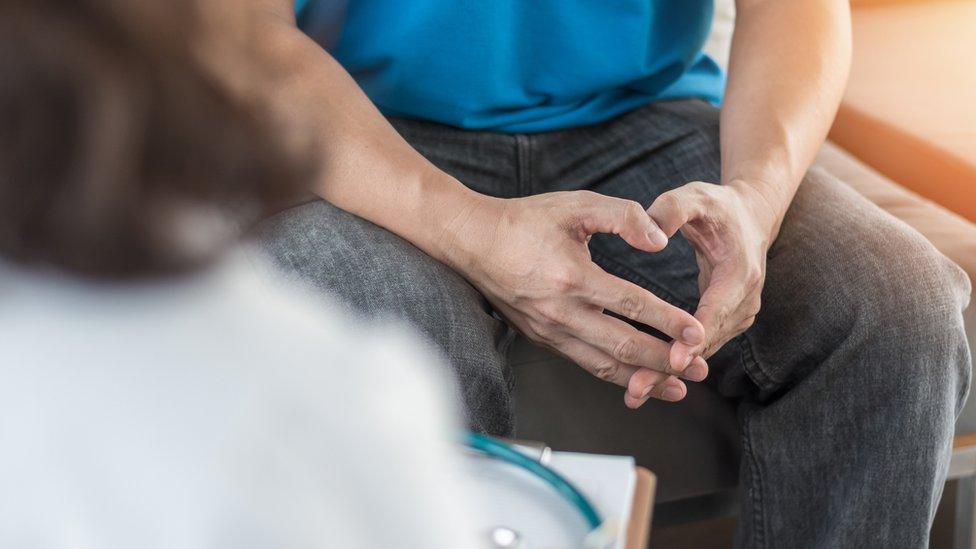Medical body NICE backs online mental health treatments
- Published

Online therapies could reduce the current six-week waiting list for mental health support in England
The National Institute for Health and Care Excellence (NICE) has recommended eight online therapies for anxiety and depression.
NICE says the therapies have the potential to help more than 40,000 people in the UK.
Each therapy must come with a formal assessment from an NHS therapist in order for it to be recommended.
According to NHS Digital, external, there is a six-week waiting list for patients who need mental health support in England.
There are hopes that introducing online digital therapies could ease pressure on the NHS.
The treatments can help those with depression, anxiety, PTSD and body dysmorphia and are centred on the use of cognitive behavioural therapy (CBT), external - a talking therapy which can help a patient manage their problems by suggesting alterations to their thought process and behaviour.
The therapies have been conditionally recommended by NICE - meaning early assessments have taken place to identify promising medical technology but more evidence needs to be gathered.
Some online treatments for PTSD have already been trialled by the NHS in Scotland and Wales.
Sarah, who was diagnosed with PTSD by a GP, trialled online therapy as part of a Cardiff University study. "I've been completely match-fit since I've done the programme," she told the BBC.
She added: "It's given me techniques that are so useful in everyday life. In work, if I've got an important meeting and I feel a bit anxious, it's taught me techniques for breathing and mindfulness."
Using a series of modules on topics related to depression, online programmes such as Beating the Blues and Deprexis offer worksheets and exercises to help people better understand their mental health problems, alongside techniques for changing their behaviour or thinking patterns.
Others, such as SilverCloud, provide mindfulness tools and resources which are designed to be completed by the patient, but overseen by a mental health practitioner.
Shows promise
Mark Chapman, interim director of medical technology and digital evaluation at NICE, said: "Our rapid assessment of these eight technologies has shown they have promise.
"Developed using tried-and-tested CBT methods, each one has demonstrated it has the potential to provide effective treatment to the many thousands of people who live with these conditions."
Using a series of trials, NICE intends to gather further information about how effective the programmes are, as well as whether they "represent good value for the NHS", Mr Chapman added.
Professor Dame Til Wykes, of the School of Mental Health and Psychological Sciences at London's King's College, cautioned "we don't know enough" about the effectiveness of online therapies and whether the therapies will offer sufficient support for mental health patients.
But she added: "We have evidence that these digital therapies hold promise. We now need to know how they work in routine practice so we can tailor them to get the most benefit."
The content manager for mental health charity Mind, Jessica D'Cruz, told the BBC: "We're always pleased to see innovation in mental health therapies that can help people have greater choice in how they are supported, and allow all of us to find a therapy that works for ourselves. But online support isn't right or accessible for everyone, so it's important that we all have a range of support offered to us.
"It's also important to remember that with the ongoing underfunding of NHS mental health services, and the issues many services are experiencing in the wake of pressures from the pandemic and cost of living crisis, the majority of people in need of mental health support will struggle to benefit from this. The UK government must urgently give mental health services the financial support they need to be able to expand the availability of new treatment options such as these."
Related topics
- Published16 June 2022

- Published15 March 2022

- Published29 November 2022
